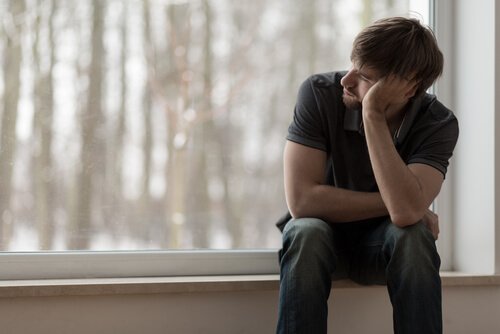When Our Partner Doesn't Understand Our Depression


Written and verified by the psychologist Valeria Sabater
Depression isn’t so simple. It’s not a cold nor a broken leg. It can’t be healed with a kiss and an “I love you”. This disorder is cruel and consuming and leaves us really anxious. It frustrates us, angers us, and makes us prefer isolation. All of this is hard for the people around us. If our partner doesn’t understand our depression, depression can become much harder.
Most clinical stories tell us a reality that sometimes goes unnoticed. Depression has a direct impact on the partner of whoever suffers it and, consequently, also on the rest of their family. Now, the difficulty doesn’t lie in accepting the presence of said disease as a fact. The problem lies in our inability to understand and deal with this type of condition effectively.
“There are wounds that never show on the body that are deeper and more hurtful than anything that bleeds.”
-Laurell K. Hamilton-
The love we profess to our partners isn’t enough in those situations, and neither is our will. Often, we have to face certain facts no one is prepared for on an emotional level. For example, we’ll see that our partner prefers to be alone than in our company. They’ll shrug away from physical contact and cease to be interested in our daily routines and struggles. It’ll be as if they’ve become a blurred shadow that even neglects themselves.
When we’re prisoners of a psychological disorder, life loses its order, meaning, and logic. If our partner doesn’t understand our depression and isn’t capable of walking by our side without pressuring or judging us, then the recovery process will be much longer.

When our partner doesn’t understand our depression
Depression is like an elephant inside a house, destroying everything. It’s also like a black hole that sucks everything up. It engulfs the person and takes them to a strange dimension where reality turns into nothing. No one prepares us to comprehend this type of process where the mind acts as our worst enemy.
Furthermore, if this condition is hard for the people suffering through it, it’s also hard for their partners. The first thing they experience is bewilderment. The depressed partner tends to be absent in every sense. This happens because the symptoms of this condition contradict the very essence of every happy relationship. There’s no emotional or sexual desire, no interest or hope.
On the other hand, the partner who doesn’t understand our depression will also feel a common feeling: guilt. Blaming themselves for a loved one’s disorder is common but erroneous.
Remember that, in most cases, there’s no specific cause for this type of condition. However, this remorse is common and can make it even more difficult to help the other person.
Partners tend to make two common mistakes. The first is blaming themselves for the disorder. The second is taking the symptoms personally. If the depressed partner prefers to sleep all day instead of going for a walk, it doesn’t mean they love their partner any less. It means they’re not able to get up, that their anguish is weighing them down, and that their mind has more power over them. We can’t get frustrated because our partner doesn’t respond to our needs, advice, or well-wishes.

How can we help our partner who’s going through depression?
Before going over the keys that could help us help our depressed partner, it’s worth dwelling on one aspect. There’s definitely something wrong if our partner doesn’t understand our depression and makes the mistake of blaming us for it. Every relationship should be mature enough to handle any obstacle, including depression.
A meaningful and healthy romantic bond knows how to deal with any problem. We have to understand that a person with depression hasn’t lost their ability to love. In fact, what they’ve lost is the ability to love themselves. It’s in this moment when they’ll need us the most. And if we’re not able to understand this, the consequences could be severe.
If our partner doesn’t understand our depression, we must give them the means to do so. However, if there’s no desire to understand and what we feel is a sense of threat and great discomfort, then we’ll have to make a big decision.
Therefore, it’s essential that we take into account the following strategies to proceed with more intimacy and sensitivity:
- Learn about depression. This is an important key to our partner’s intervention and recovery process. Going with them to therapy and listening to what professionals have to say of their depression will be of great help.
- Don’t force, don’t pressure, and don’t focus on objectives. Depression demands time, has ups and downs, and never responds to pressure or ultimatums. The depressed person is the only one responsible for their recovery process. We must respect their pace without demanding things from them.
- Accompany them but also give them space. Don’t be confused if your partner takes a step back and decides not to go out for a walk with you. If they choose to stay in bed, don’t yell at them. Remind them that you’re there for whatever they need. Don’t judge, although it may be difficult. Be that close presence that knows how to give support in silence.
- Remember that each one of you has your own responsibilities. The only thing a depressed person needs to focus on is their recovery. On the other hand, you can’t neglect your life, work, and other things that keep you emotionally balanced. Each one of you has your own responsibilities. You have to tend to your well-being in order to be the best person you can be for your depressed partner.

In conclusion, depression isn’t easy for anybody. If our partner doesn’t understand our depression and shows no signs of wanting to help us through this process, the best thing we can do in these cases is to make a decision that best benefits us. It won’t be easy. However, if the goal is to recover, it’s necessary to get out of that difficult and harmful relationship.
On the other hand, we must make an effort to not reject the help our partner offers us. If it’s not to our liking, we need to tell them exactly what we need. In the end, having an intimate partner willing to help us is a powerful force. We can use this in our favor, along with a little emotional intelligence, to get out of that black hole.
This text is provided for informational purposes only and does not replace consultation with a professional. If in doubt, consult your specialist.








